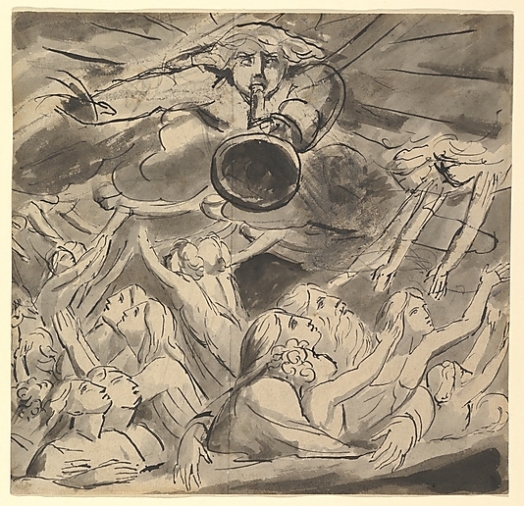Throughout Advent, I will be sharing songs and images that connect to each Sunday’s lectionary text. This week, the song is “The Trumpet Child,” by Over the Rhine.
The image is “The Last Trumpet (recto); Two studies of a right eye, a profile of an open-mouthed young man, the head of an eagle, and the head of a lion (verso)” by William Blake (British, London 1757–1827 London)

Medium: Pen and gummed carbon black ink and layered gray ink washes with graphite underdrawing; verso: black chalk
Dimensions: sheet: 8 1/16 x 8 3/8 in. (20.5 x 21.2 cm)
Classification: Drawings
Credit Line: Fletcher and Van Day Truex Funds, 2011
Accession Number: 2011.448
Available for educational use from http://www.metmuseum.org
Sermon Text: Luke 21:25-36
We’re going to start with a little experiment this morning. I want you to close your eyes. I’m going to say one word, and I want you to pay attention to what comes to your mind first—especially the images, or pictures, but if words come to mind, first, pay attention to those, too. Okay? Here’s the word:
Christmas
What was the first thing that came to your mind? Anyone willing to share? Let’s be honest, here, okay? We don’t have to give the Sunday School answer.
(Answers this morning included, “family,” “Santa,” “Christ,” “joy,” “sharing” and “cactus”)
Often, when Christmas is portrayed on television, or on greeting cards, or in advertisements, it is bright, happy, serene. The fire crackles. The snowflakes glitter. Cheeks are rosy.
If it is a religious image at all, it tends to be one with happy, beautiful angels and a nativity scene that seems straight out of Silent Night—all is calm, all is bright.
Our gospel lesson for today paints a very different picture, doesn’t it? Distress, confusion, roaring waves, fainting, fear, foreboding. Not your picture perfect Christmas card.
In fact, it can be a pretty jarring passage to read at this time of year. It is unsettling.
But, let’s be honest again. Isn’t life pretty unsettling? We don’t like to think about it, but it is true. Life is full of tragedy. People we love die—sometimes way too young, or in painful, shocking ways. Tragedies happen. Homes burn to the ground. Children go missing. Storms flood whole communities. Droughts ravage farms.
Crisis is a part of life. Every one of us has had, and will have times in our lives when it feels like we are struggling just to keep our heads above water. Distress. Confusion, Roaring waves, fainting, fear, foreboding.
We may not like to dwell on it, but these experiences are part of life. There is a passage in 1 John that is sometimes used to introduce a prayer of confession: “If we say we have no sin, we deceive ourselves and the truth is not in us.” Well, I think we can just as easily say, “If we say that we can avoid crisis, we deceive ourselves and the truth is not in us.”
Religion, or spirituality, is not about avoiding crisis, or finding a way to face hardship in life without it touching you, or causing panic, or pain. No, the spiritual life is about facing the truth—facing reality head-on—and finding God and God’s grace working right smack in the midst of the messy, frightening, painful crises of life.
That is what the Christmas story is about. That’s why I love digging just a little bit deeper than the Silent night, holy night, all calm and all bright. The true depth of the Christmas story is in some beloved Christmas carols, too:
No more let sins and sorrows grow, nor thorns infest the ground. He comes to make his blessings flow far as the curse is found.
Why lies he in such mean estate, where ox and ass are feeding? Good Christians, fear; for sinners here the silent Word is pleading.
One that has much more impact now that I’ve lived in Central New York:
In the bleak midwinter, frosty winds made moan. Earth stood hard as iron, water like a stone; snow had fallen snow on snow, snow on snow, in the bleak midwinter, long ago. Our God, heaven cannot hold him, nor earth contain. Heaven and earth shall flee away when he comes to reign…
And my personal favorite—and one we will be singing later this morning:
And ye, beneath life’s crushing load, whose forms are bending low, who toil along the climbing way with painful steps and slow, Look now! For glad and golden hours come swiftly on the wing: O rest beside the weary road and hear the angels sing.
These hymns announce good news in the midst of trouble, good news to people who feel stuck, lost, hurt, broken. Our passage from Luke is one that reminds us that crisis is not a time to bow our heads in defeat and assume God has abandoned us. The God we worship is the God who created the world out of chaos. The God we worship is the one who takes the stuff of the world and improvises like a master jazz musician, creating beauty out of the dissonance, bringing order and rhythm to whatever choices we make and whatever surprises life brings our way.
Crisis is precisely the time to lift our heads, to open our eyes, to keep alert, knowing that God is near—that even when the worst happens, God is present, God is with us. Emmanuel means “God with us.” So let us step forward into this Advent season by singing the words of longing and hope and faith in the familiar hymn, “O Come, O Come Emmanuel.”
Reblogged this on The Theological Wanderings of a Street Pastor and commented:
Since I didn’t have my own sermon text to post this week, I refer you to my wife’s. Worth reading. I learned how to preach from her.